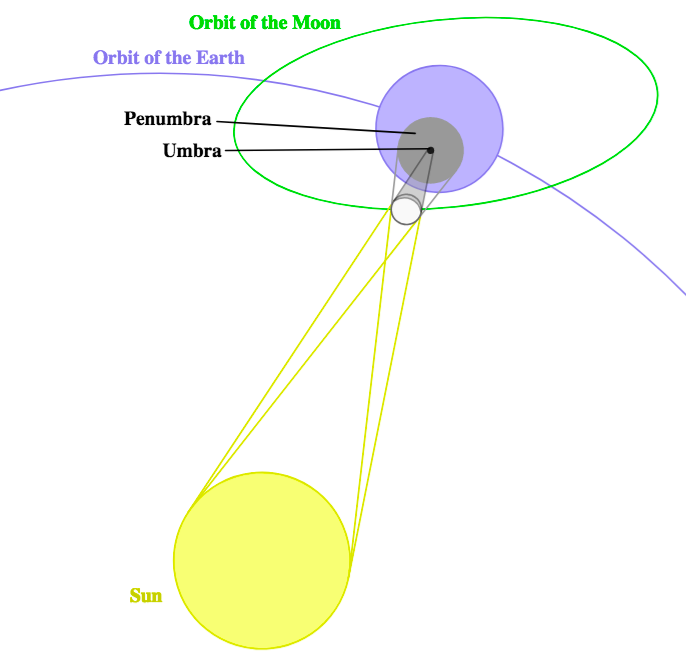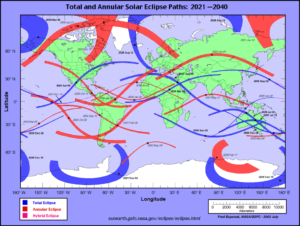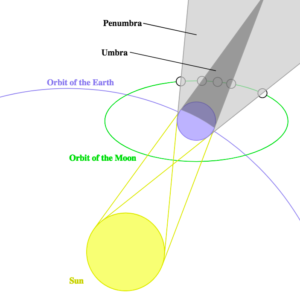Eclipses Around the World

Although the influence of the signs is sometimes contested, everyone with an interest in stars agrees that eclipses are powerful celestial events. This essay gives an overview of a few of the countless ways humans mark and celebrate both lunar and solar eclipses.
What Is an Eclipse?
All eclipses are caused by particular alignments of the earth, sun, and moon, but we divide them into “lunar eclipses” and “solar eclipses” depending on whether the moon is covered (by the earth) or the sun is covered (by the moon). Solar eclipses happen only during the new moon, and lunar eclipses happen only during the full.
A solar eclipse that achieves totality (when the sun is completely covered by the moon) is the only event I know of that is celebrated across the globe by people of secular and spiritual backgrounds alike. The same eclipse will not achieve totality all across the globe—some solar eclipses never reach totality at all, and are called partial eclipses, but for those that are called total eclipses, the totality will be visible to people in a relatively narrow area, while those on either side will be able to observe a partial eclipse. The path of the upcoming total solar eclipse in 2024 is visible in blue in the upper left of the map to the left.
Eclipse Celebrations & Observations Across the Globe
In many places, it’s common to gather in large groups outside and wear special glasses to be able to observe the eclipse directly without harming the eyes.
In the United States, these gatherings are usually hosted by secular organizations open to the general public, but people of a variety of religious backgrounds attend, especially Christians, who make up about 66% of the population (only a small percentage of Christians view eclipses as a prophesy of natural disaster or other threatening message from the divine).
Smaller religious and cultural communities often host their own public or private events and mark the occasion in their own ways. Among the hundreds of different contemporary indigenous nations of Turtle Island, these traditions vary widely. For Diné (Navajo) people of the Colorado Plateau, the day is often taken off of work, or schools are closed, to allow time for private indoor ceremony. Byron Tsabetsaye of San Juan College Native American Center said in a 2017 interview:
“The eclipse is a renewal process. It is a rebirth. So for people to be respectful, they shouldn’t be doing activities like drinking, eating, sleeping—even really encouraged to be in the most peaceful state they can be in. Some sing songs or practice meditation.”
Other Diné people remain indoors but focus on the science side of things, holding educational workshops for the public.
On the other side of the continent, the Tsalagi (Cherokee) people still living on their ancestral lands in the Appalachian Mountains host a public outdoor ceremony. The format has changed since pre-contact times but it remains a noisy outdoor celebration.
Hinduism is a large and diverse religion, with an estimated 1.3 billion Hindus worldwide. Solar eclipses have been viewed as negative events from antiquity, and are still observed with fasting, prayer, and meditation. Hindu temples close, and people may take a cold bath to ritually cleanse after the eclipse is over, though religious observation doesn’t stop school children and teachers from gathering outside to learn about eclipses and how to witness them safely.
Judaism is another ancient religion whose adherents today live around the world. In centuries past, eclipses were viewed as bad omens or divine response to human transgression, but today, thought is changing and some Jewish synagogues host viewing events. Jewish scholar Jeremy Brown said in a 2017 interview:
“Today, an eclipse is no longer seen as a threat, as an omen but as something to be celebrated. There is a consensus of opinion amongst the rabbis that an eclipse should be witnessed with joy and happiness and appropriate psalms and blessings.”
This is by no means a complete list of the way eclipses are marked across the world, but is intended to be a sample of the different—and very similar!—eclipse traditions across different peoples. Of course in any of the communities I mention here, there will be individuals who cleave strongly to cultural practices and individuals who don’t feel strongly about them. Diversity is as valuable in the human experience as it is in the garden!
Lunar Eclipses
It seems each tradition treats solar and lunar eclipses similarly—in my research, I didn’t find record of a community that viewed one as immensely favorable and the other as immensely negative. For instance, solar eclipses are viewed as more negative than lunar eclipses in Hinduism, but the same cleansing rituals are observed after each.
Specific ceremonies may vary between solar and lunar eclipses, or there may be different prohibited activities associated with each. Contemporary Jewish scholar Jeremy Brown wrote in a 2017 essay that particularly lunar eclipses can be marked by fasting and that getting married on the day of a lunar eclipse is to be avoided, according to rabbis of previous centuries.
Gardening Under an Eclipse
One thing that held true across my research is that an eclipse is a day apart from regular life. Some people warn against gardening specifically, where others don’t mention it by name but say, for instance, to stay indoors which rules out gardening for most of us!
Of course in ancient times, our ancestors only knew about those eclipses that passed directly overhead. Now we know about them not only anywhere on the planet, but many years in advance. Some teachers still advise to observe only when an eclipse is visible from where you are, where other people may prefer to mark all eclipses—often there are livestreams online that allow you to watch an eclipse no matter where you are, also helpful for those of us that live in very cloudy places.
When putting the 2024 calendar together, I considered making eclipses rest days, but ultimately decided against it. These days have been left blank to allow for flexibility—always helpful in the life of a lunar gardener. Most years have about four eclipses, and I encourage you to look up if they will be visible in your area or not, and to find a local group celebrating it in a way you feel called to join in with, or mark it privately in your own way.
Sources
All images from Wikimedia or NASA and in the public domain.
All text © Wolf Hill Press, 2023




